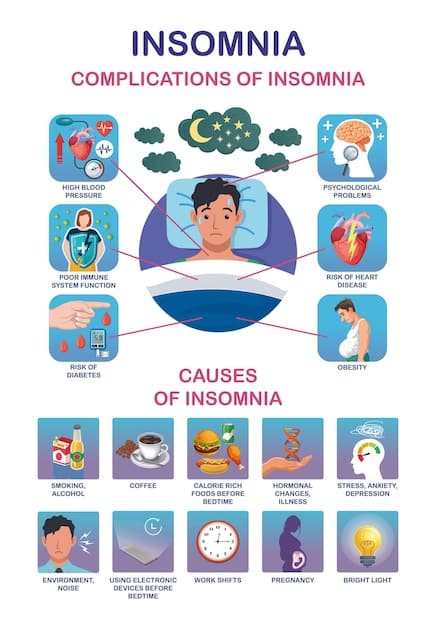Reset Your Sleep: A 7-Day Plan for Mental Well-Being

Is your sleep schedule sabotaging your mental well-being? A 7-day reset plan can help you re-establish a healthy sleep pattern through simple adjustments to your daily routine, improving mood, focus, and overall mental health.
Is your constant fatigue and foggy thinking starting to feel like more than just a lack of sleep? It could be your sleep schedule impacting your mental health. Discover is your sleep schedule sabotaging your mental well-being? a 7-day reset plan that can help you reclaim your nights and days.
The Unexpected Link Between Sleep and Mental Health
Most people understand that sleep is important, but few realize just how deeply intertwined it is with mental health. Disrupted sleep patterns can trigger a cascade of negative effects, impacting mood, cognitive function, and even the ability to manage stress.
Understanding this connection is the first step in taking control of your well-being.
The Science Behind Sleep and Mental Health
The sleep-mental health connection is rooted in biology. Sleep plays a crucial role in regulating neurotransmitters, such as serotonin and dopamine, which are vital for mood regulation. When sleep is disrupted, these neurotransmitters become unbalanced, potentially leading to mood swings, anxiety, and even depression.
- Neurotransmitter Regulation: Sleep helps maintain the balance of key neurotransmitters.
- Stress Hormone Control: Lack of sleep increases cortisol levels, contributing to stress and anxiety.
- Brain Function: Adequate sleep is essential for cognitive functions like memory and concentration.

Common Sleep Disruptors
Many factors can disrupt your sleep schedule, from lifestyle choices to environmental conditions. Identifying these disruptors is crucial for effective sleep management.
Let’s explore some common disruptors and their potential impact.
- Screen Time: The blue light emitted from screens can interfere with melatonin production.
- Caffeine and Alcohol: These substances can disrupt sleep cycles and reduce sleep quality.
- Stress and Anxiety: Worrying thoughts can keep you awake at night, creating a vicious cycle of sleeplessness and anxiety.
Understanding the profound connection between sleep and mental health is essential to prioritize a healthy lifestyle.
Assessing Your Current Sleep Schedule
Before starting a 7-day reset plan, it’s important to understand your current sleep habits. This assessment will help you identify areas that need improvement and provide a baseline to measure your progress.
Evaluating your sleep patterns will allow you to make more informed decisions about the changes you need to implement.
Tracking Your Sleep
The first step in assessing your sleep schedule is tracking your sleep patterns. There are several methods you can use, from simple pen-and-paper logs to sophisticated sleep tracking apps.
Let’s explore a few methods and their benefits.
- Sleep Diary: Record your bedtime, wake-up time, and any sleep disturbances you experience.
- Sleep Tracking Apps: Use apps like Sleep Cycle or Fitbit to automatically track your sleep patterns and provide insights into your sleep quality.
- Wearable Devices: Devices like Apple Watch or Garmin can monitor your sleep stages and heart rate, offering a comprehensive view of your sleep health.
Identifying Key Issues
Once you’ve tracked your sleep for a few days, it’s time to identify the key issues affecting your sleep. Look for patterns in your sleep data and consider how your daily habits might be influencing your sleep.
A few details to look into:
- Inconsistent Bedtimes: Going to bed and waking up at different times each day can disrupt your body’s natural sleep-wake cycle.
- Frequent Wake-Ups: Waking up multiple times during the night can indicate underlying sleep issues, such as sleep apnea or insomnia.
- Daytime Sleepiness: Feeling excessively tired during the day can be a sign of poor sleep quality or insufficient sleep duration.

The process can be automated. There are various apps and wearables that can help with the process.
Day 1-2: Establishing a Consistent Sleep Environment
The first few days of the reset plan focus on creating a consistent and conducive sleep environment. This involves optimizing your bedroom for sleep and establishing a relaxing bedtime routine to signal your body that it’s time to wind down.
Making these changes sets the stage for better sleep and improved mental health.
Optimize Your Bedroom
Your bedroom should be a sanctuary for sleep. Ensure it’s dark, quiet, and cool to promote relaxation and sleepiness. Use blackout curtains, earplugs, or a white noise machine to minimize distractions.
Create a Relaxing Bedtime Routine
A calming bedtime routine can help you relax and prepare for sleep. This could include taking a warm bath, reading a book, or practicing gentle stretching exercises.
- Dim the Lights: Lower the lights in your home an hour or two before bedtime to stimulate melatonin production.
- Limit Screen Time: Avoid using electronic devices at least an hour before bed to minimize the effects of blue light.
- Practice Relaxation Techniques: Engage in activities that promote relaxation, such as meditation, deep breathing exercises, or gentle yoga.
Establishing a consistent sleep environment is a fundamental part of the 7-day reset plan. It helps set the stage for better sleep and improved mental health.
Day 3-4: Adjusting Your Daily Habits
During days three and four, the focus shifts to adjusting your daily habits to support better sleep. This includes making changes to your diet, exercise routine, and caffeine intake.
By making these adjustments, you can improve your overall sleep quality and mental well-being.
Dietary Changes
What you eat and drink can significantly impact your sleep. Avoid heavy meals, sugary snacks, and excessive fluids close to bedtime. Focus on a balanced diet rich in fruits, vegetables, and whole grains.
Exercise Routine
Regular exercise can improve sleep quality, but avoid intense workouts close to bedtime. Aim for moderate exercise during the day, such as walking, jogging, or swimming.
- Morning Exercise: Exercising in the morning can help regulate your body’s natural sleep-wake cycle.
- Avoid Late-Night Workouts: Intense workouts close to bedtime can increase alertness and make it harder to fall asleep.
- Stay Hydrated: Drink plenty of water throughout the day to support overall health and sleep quality.
The changes you make during these days will significantly contribute to improving your overall sleep quality and mental well-being.
Day 5-6: Managing Stress and Anxiety
Stress and anxiety are major contributors to sleep problems. Days five and six of the reset plan focus on implementing strategies to manage stress and anxiety, promoting relaxation and better sleep.
These techniques will not only improve your sleep but also enhance your overall mental resilience.
Mindfulness and Meditation
Mindfulness and meditation can help you calm your mind and reduce racing thoughts that keep you awake at night. Practice mindfulness exercises or guided meditation to promote relaxation and mental clarity.
Journaling
Writing down your thoughts and feelings in a journal can help you process emotions and reduce anxiety. Spend a few minutes each night journaling about your day or any concerns you may have.
- Gratitude Journaling: Focus on writing down things you are grateful for to promote positive emotions and reduce stress.
- Problem-Solving Journaling: Use journaling to identify and brainstorm solutions to problems that are causing you stress.
- Emotional Release Journaling: Write freely about your emotions without judgment to release pent-up feelings.
By actively managing stress and anxiety, you can create a more peaceful and restful sleep environment.
Day 7: Evaluating and Maintaining Your Progress
The final day of the reset plan is about evaluating your progress and establishing a long-term strategy for maintaining your improved sleep habits. Reflect on the changes you’ve made and how they’ve impacted your sleep and mental health.
This step is crucial for ensuring that the positive changes you’ve made become sustainable.
Reflecting on Your Progress
Take some time to reflect on the changes you’ve made over the past week. Consider how your sleep quality, mood, and overall mental well-being have improved. Identify any challenges you faced and strategies you found helpful.
Long-Term Strategies
To maintain your improved sleep habits, develop a long-term strategy that incorporates the changes you’ve made during the reset plan. This could include setting consistent bedtimes and wake-up times, practicing stress-management techniques, and maintaining a healthy lifestyle.
- Consistency is Key: Stick to your sleep schedule as much as possible, even on weekends.
- Regular Check-Ins: Periodically review your sleep habits and make adjustments as needed.
- Seek Professional Help: If you continue to struggle with sleep problems, consult a healthcare professional for further evaluation and treatment.
By consistently implementing these strategies, you can ensure that your sleep schedule supports your mental well-being long-term.
| Key Element | Brief Description |
|---|---|
| 🌙 Consistent Sleep | Maintain a regular sleep-wake cycle for better sleep. |
| 🧘 Stress Management | Use mindfulness to reduce anxiety. |
| 😴 Sleep Environment | Optimize the room for sleep. |
| 📅 Habit Adjustments | Adjust diet and daily routine for better sleep. |
Frequently Asked Questions
▼
Sleep helps regulate neurotransmitters crucial for mood and cognitive function, preventing mood swings and improving focus.
▼
Make sure your bedroom is dark, cool, and quiet. Use blackout curtains, earplugs, or a white noise machine to minimize distractions.
▼
Avoid heavy meals, sugary snacks, and excessive fluids before bed. Eat a balanced diet with plenty of fruits, vegetables, and whole grains.
▼
Practice mindfulness, meditation, or journaling. These techniques help calm your mind and reduce anxiety, promoting better sleep.
▼
If you still struggle with sleep issues, consult a healthcare professional for evaluation and potential treatment options.
Conclusion
Taking charge of your sleep schedule is a powerful step towards improving your mental health. By following this 7-day reset plan, you can establish healthier sleep habits, manage stress, and create a more balanced and fulfilling life. Prioritize your sleep and unlock the potential for a brighter, more energized you.





